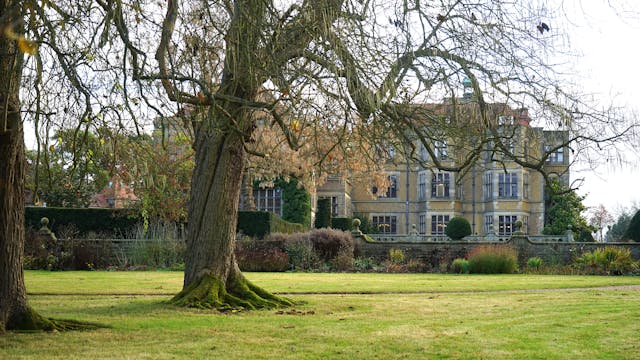
Manor, mansion, villa, stately home or hall? They are all words that describe a large, expensive house, but they have slightly different origins.
A manor is a British term now, but the tradition of manors comes from all over western Europe, having started in Rome. The word comes from the Latin “manere”, which meant remain, and then the French “maner”, which means dwelling. Manor referred to an agricultural estate that had many people working on it but was run by one person, the lord of the manor. Europe ran on a feudal system and the Norman conquest brought that system to England. With a feudal system, the king is at the top and he owned all land in the country. He was followed by nobles and the king could grant land to them. The nobles could then spilt up that land and hand it out to people below them. Each piece of land was divided up into manors, which had a lord of the manor living in a manor house, and various small pieces of land that were rented to serfs. These serfs had a house and a small piece of land that they were allowed to farm, and in return they had to give a certain amount of the produce to the lord of the manor. They were not slaves and could leave, although they had to get permission from the lord of the manor before they did. The house that the lord of the manor lived in was called the manor house and its size depended on the status of the lord. The manor house was usually fortified, and the serfs could go there for protection if it was needed. The feudal system ended in the 15th century, but the idea of a manor and the lord of the manor continued. These days, we just use manor house to refer to a large house with agricultural land. The word manor is also used in other ways as well, these days. A gangster or a policeman might call the area they control their “manor”.
A mansion is a very large house and the word comes from the same Latin route as manor. Many mansions and manors appear to be the same, but their primary function is slightly different. A manor was the place where the lord who controlled all of the serfs in the manor lived and it had associated agricultural land, while a mansion is a large, expensive house that is merely a dwelling. Once things became safer, a few centuries after the Norman invasion of England and the end of the 100 years war, there wasn’t any real need for fortified manor houses. The nobility started to build houses that were merely showed off their wealth. These might be on the manor, or they might be somewhere else. After the Industrial Revolution, when many people became rich without associations with agriculture, the number of mansions increased.
A villa is very similar to a manor, but it comes from Rome. A villa was a country estate with one house that controlled agricultural lands. The word is from the Latin “villa”, which meant “country house” or “farm”. They were owned by wealthy people who probably had another house in the city. A lot of wealthy Romans used them as a country house to get away from the city.
A stately home can be a manor or a mansion. It is a British term and it refers to an old country house that is or was occupied by an aristocratic or wealthy family. They usually have a lot of history associated with them. The phrase “stately home” was only coined in 1827 and it was used in a poem by Felicia Hemans called “the Homes of England”. Britain had a lot of stately homes, but many were demolished by their owners when they could no longer afford to keep them. Stately homes require a lot of money. The National Trust is an organization that was set up in 1895 to try to save some of these buildings.
A hall was literally a large room used for day to day life. Early buildings were basically built around their hall. The hall was used for meeting, greeting, eating, merrymaking, and many other important events. It comes from Old English, “heall”, where it meant a “spacious roofed residence” or a “house”. By the 14th century, the hall still existed in many large houses and buildings, but people had a lot of other smaller rooms as well. The hall started to lose some of its importance. However, because it was so important, the word “hall” came to be associated with large houses. Manors were sometimes called halls. And you can see the word in many places today, not just in the names of stately homes. We have town hall, city hall, music hall, banquet hall, dance hall, sports hall, and even arrival hall at an airport. And this is what I learned today.
Photo by Mike Bird: https://www.pexels.com/photo/bare-tree-on-green-grass-field-242254/
Sources
https://www.thoughtco.com/definition-of-manor-1789184
https://en.wikipedia.org/wiki/Manorialism
https://www.studentsofhistory.com/the-manor-system
https://en.wikipedia.org/wiki/Mansion
https://en.wikipedia.org/wiki/Villa
https://www.mansionglobal.com/library/villa
https://en.wikipedia.org/wiki/English_country_house
https://en.wikipedia.org/wiki/Destruction_of_country_houses_in_20th-century_Britain
https://www.bbc.co.uk/history/british/middle_ages/great_hall_01.shtml
